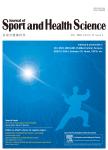The effects of aerobic exercise training on oxidant-antioxidant balance, neurotrophic factor levels, and blood-brain barrier function in obese and non-obese men
The effects of aerobic exercise training on oxidant-antioxidant balance,neurotrophic factor levels,and blood-brain barrier function in obese and non-obese men作者机构:Department of Physical Education College of Arts and Physical Education Dong-A University Busan 604-714 Republic of Korea Sports and Health Care Major College of Humanities and Arts Korea National University of Transportation Chungju-si 380-702 Republic of Korea
出 版 物:《Journal of Sport and Health Science》 (运动与健康科学(英文))
年 卷 期:2017年第6卷第4期
页 面:447-453页
核心收录:
学科分类:0403[教育学-体育学] 040302[教育学-运动人体科学(可授教育学、理学、医学学位)] 04[教育学]
基 金:supported by the Dong-A University research fund
主 题:Blood-brain barrier Exercise training Neurotrophic factor Obesity Oxidative stress Redox balance
摘 要:Purpose: The purpose of this study was to investigate the effects of obesity and aerobic exercise training on oxidant-antioxidant balance,neurotrophic factor levels, and blood-brain barrier(BBB) ***: Ten non-obese healthy men(body mass index 25 kg/m2) and 10 obese men(body mass index ≥ 25 kg/m2) were included in the *** groups performed treadmill exercise for 40 min 3 times weekly for 8 weeks at 70% heart rate reserve. Blood samples were collected to examine oxidant-antioxidant balance(reactive oxygen species(ROS) and superoxide dismutase(SOD) activity levels), neurotrophic factors(brain-derived neurotrophic factor(BDNF), nerve growth factor, and glial cell line-derived neurotrophic factor levels), and BBB function(S100βand neuron-specific enolase(NSE) levels) before and after exercise ***: The obese group showed significantly greater changes than the non-obese group in serum ROS(-0.46 ± 0.31 mmol/L vs.-0.10 ±0.17 mmol/L,p=0.005),serum S100 p levels(-8.50 ± 5.92 ng/L vs.-0.78 ± 5.45 ng/L,p=0.007),and serum NSE levels(-0.89 ± 0.54 μg/L vs.-0.01 ± 0.74 μg/L,p= 0.007) after training. At baseline,the obese group showed significantly higher serum ROS and S100β levels and significantly lower serum SOD activity and BDNF levels than the non-obese group(p 0.05). The obese group showed significantly lower serum ROS, S100β,and NSE levels and significantly higher serum SOD activity and BDNF levels after training compared with baseline(p 0.05).Conclusion: These results suggest that obesity can reduce serum neurotrophic factor levels and can induce BBB dysfunction. On the other hand,aerobic exercise can improve an oxidant-antioxidant imbalance in obese subjects and limit BBB dysfunction.



